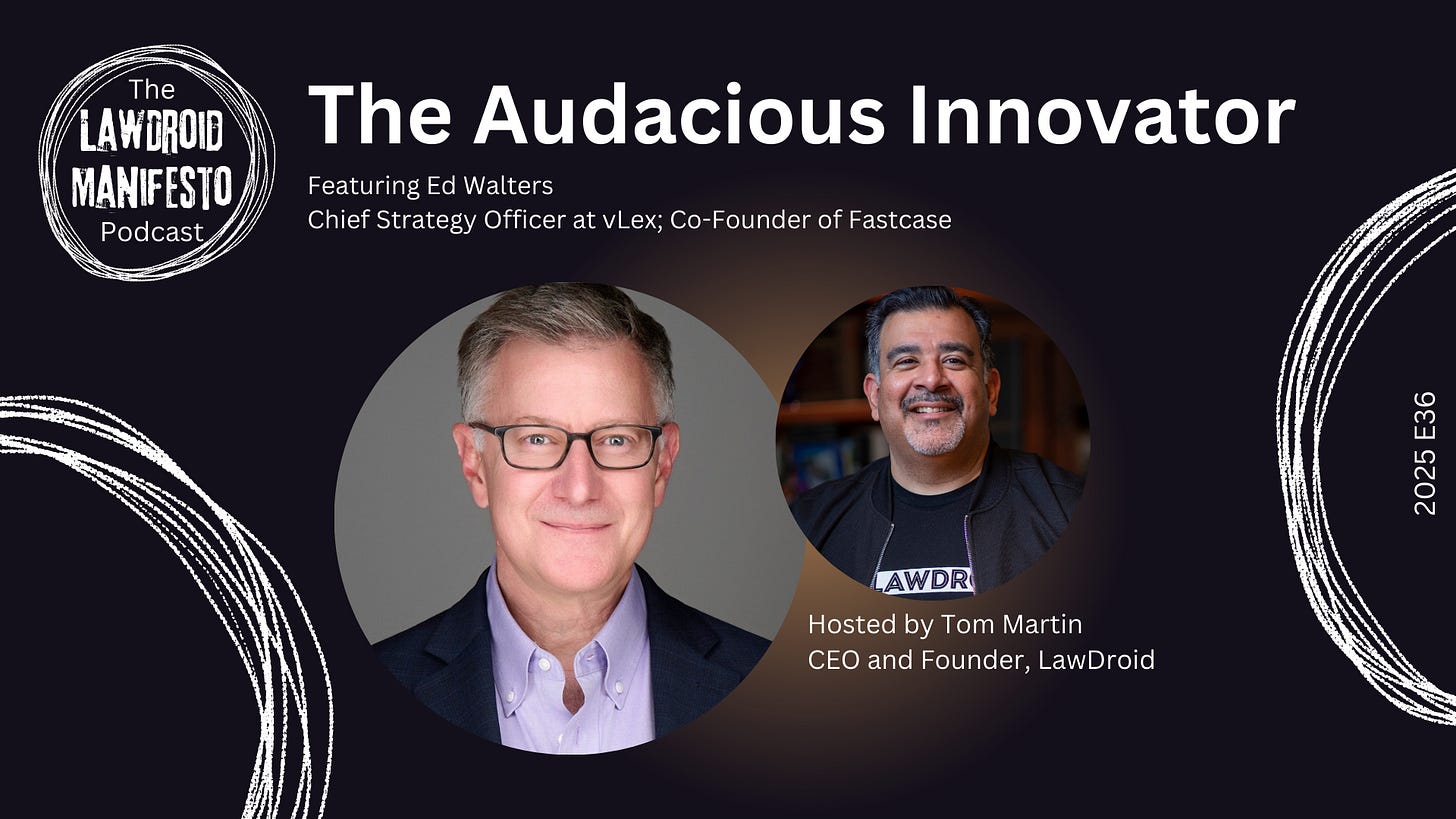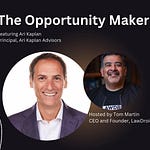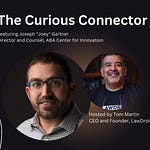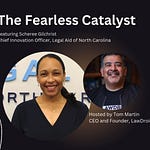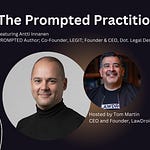Hey there Legal Rebels! 👋 I'm excited to share with you the 36th episode of the 2025 season of the LawDroid Manifesto podcast, where I will be continuing to interview key legal innovators to learn how they do what they do. I think you're going to enjoy this one!
I’ve known Ed Walters for years and, here’s the thing, Ed doesn't come across as someone who'd take these audacious risks. Yet his quiet confidence and mission-driven approach have consistently led him to innovate where others wouldn't dare. And, that’s why I’ve dubbed him, “The Audacious Innovator.” I hope you enjoy watching this episode as much as I enjoyed chatting with Ed.
If you want to understand how to build a mission-driven legal technology company that truly serves lawyers and democratizes access to justice while maintaining the perseverance to bootstrap your way through the dot-com crash and beyond, you need to listen to this episode. Ed is a visionary who saw the future of legal research in 1999 and had the audacity to build it from scratch.
Building Legal Tech's Most Democratic Success Story
Join me as I interview Ed Walters, Chief Strategy Officer at vLex and co-founder of Fastcase.
In this compelling podcast episode, Ed shares his remarkable journey from growing up in poverty in Louisiana to working in the White House speechwriting office to co-founding one of the most successful legal technology companies in history. He reveals how a late-night frustration with legal research monopolies at Covington & Burling led to a 20-year mission to democratize legal research for over 1.2 million lawyers nationwide. Ed also discusses the strategic merger with vLex and how their combined global reach and AI capabilities through Vincent AI are transforming legal practice worldwide.
His stories demonstrate the power of mission-driven entrepreneurship, showing how two lawyers with no special business training could bootstrap a company through the worst possible market conditions by staying focused on serving their customers. This episode offers invaluable insights for anyone considering legal entrepreneurship or seeking to understand how persistence and values-driven decision-making can create lasting impact in the legal profession.
[This interview was recorded prior to the announcement of Clio’s acquisition of vLex.]
The Skinny
Ed Walters, Chief Strategy Officer at vLex and co-founder of Fastcase, shares his inspiring journey from growing up in poverty in Baton Rouge to co-founding one of legal tech's most successful companies. Raised by a first-generation lawyer father who became Louisiana State Bar Association president, Ed learned early about hard work and ethical practice. After working in the George H.W. Bush White House speechwriting office and practicing at Covington & Burling, a late-night research frustration led Ed and physicist-turned-lawyer Phil Rosenthal to build Fastcase in 1999, during the worst possible time to start a tech company. Through 20 years of bootstrapped growth, partnerships with state bar associations, and unwavering focus on democratizing legal research, they built a platform serving 1.2 million of America's 1.3 million lawyers. The 2023 merger with Spanish company vLex created a global legal AI powerhouse with Vincent AI, combining Fastcase's deep US legal database with vLex's 100-country coverage and advanced AI capabilities.
Key Takeaways:
Ed's upbringing in poverty taught him the value of hard work and mission-driven purpose, watching his father build a successful law practice from nothing
Early exposure to technology and government through his White House internship and speechwriting role shaped his vision for using technology to scale justice
The Fastcase founding story began with a simple frustration, a client demanding legal research without using expensive incumbent services that didn't exist as alternatives
Starting a legal tech company in 1999 during the dot-com crash required bootstrapping, with co-founder Phil Rosenthal literally tightening his belt from lack of funds
Partnership strategy with state bar associations was crucial to Fastcase's success, eventually serving 1.2 million of America's 1.3 million lawyers
The 2023 vLex merger created a perfect combination: vLex's global reach and AI engineering talent with Fastcase's deep US market penetration and product expertise
Vincent AI's 23 workflows across 17 countries demonstrate how quality legal data can eliminate AI hallucinations and create superior products
Work-life balance requires obsessive organization using GTD methodology and the Eisenhower decision matrix to prioritize important over urgent tasks
Mission-driven companies can achieve extraordinary success by staying focused on democratizing access and making legal practice smarter
Entrepreneurship doesn't require special credentials—persistence, values-driven decision making, and asking "why not us?" can overcome any background
Notable Quotes:
"I can't believe we pay for a taxpayer expense, a law to be prepared right, to have judges and clerks like draft these opinions, legislators, write laws, agency regulators, draft regulations. We do this at taxpayer expense and then we give it away to these monopolists who sell it back to us for these highly arbitrage prices." - Ed Walters (33:03-33:29)
"There is going to be like a big alternative to the incumbents in legal research. And there's no reason why someone else has the right for it to be them instead of us." - Ed Walters (39:54-40:02)
"Phil and I were not like magic business people or like super entrepreneurs. There was nothing in our education or background that would say it should be us and not somebody else. You don't have to have like a degree on your resume or a particular set of history, work experiences, something on your LinkedIn, somebody that you know, in order to be that entrepreneur." - Ed Walters (40:20-40:45)
"Working in partnership with state bar associations, 1.2 million of the 1.3 million lawyers in the United States had subscription access to legal research. That meant they could represent their clients without fear of getting it wrong." - Ed Walters (42:48-42:59)
"Vincent AI is like a platform of 23 different workflows and growing. And it has the law of 17 countries in it. It's multilingual, multimodal. The products are amazing. Like having the data as a grounding for this avoids all the hallucinations that have been the biggest problems of legal AI." - Ed Walters (46:44-46:59)
"I wanted to take the law degree and use software to scale justice. And now I have the opportunity about it. That's a huge motivator for me." - Ed Walters (57:59-58:08)
"If I go all the way back to when I was a doe-eyed, enthusiastic young law student, this is exactly what I wanted to do. I wanted to take the law degree and use software to scale justice." - Ed Walters (57:55-58:06)
"The idea that you would rank search results by relevance. Fastcase invented it for a service to do it. The idea that you would put citation analysis in the results and use it to rank. Got a patent for that." - Ed Walters (35:26-35:36)
Clips
Public Laws Held Hostage for Profit
The Hidden Chaos Behind Political Speeches
Legal Research Software is Embarrassingly Bad
We Invented Legal Search Features You Now Expect
Ed's journey exemplifies the power of mission-driven entrepreneurship in legal technology. From his humble beginnings watching his father build a law practice while struggling financially, to his formative experience in the White House learning about government service, every step prepared him to tackle the monopolistic practices in legal research. The late-night encounter with Phil Rosenthal at Covington & Burling wasn't just luck, it was preparation meeting opportunity.
What makes Ed's story particularly compelling is how he and Phil persevered through the worst possible market conditions for a tech startup. Starting Fastcase in 1999, just before the dot-com crash, required extraordinary resilience and faith in their mission. Their decision to bootstrap rather than chase venture capital allowed them to stay true to their democratizing vision, building partnerships with state bar associations rather than serving only the highest-paying clients.
The 2023 merger with vLex represents the culmination of this vision on a global scale. By combining Fastcase's deep US legal database and state bar relationships with vLex's international reach and AI capabilities, they've created something neither company could have achieved alone. Vincent AI's ability to eliminate hallucinations through quality legal data demonstrates how the right foundation can transform AI from a liability into a powerful tool for justice.
Closing Thoughts
Ed Walters embodies everything I believe about the future of legal technology, that the most transformative innovations come from practitioners who understand real problems and commit to solving them for the right reasons. His story proves that you don't need venture capital, special credentials, or perfect market timing to build something that matters. You need persistence, clear values, and the audacity to ask "why not us?"
What strikes me most about Ed's approach is how he's maintained his mission throughout every phase of growth. From the initial frustration with legal research monopolies to today's global AI platform, every decision traces back to democratizing the law and making legal practice smarter. That consistency of purpose, combined with obsessive attention to organization and work-life balance, shows how sustainable success really works.
The vLex merger story (and now vLex’s acquisition by Clio!) offers a masterclass in strategic partnerships. Instead of selling out or losing their mission, Ed and Phil found a way to amplify their impact globally while maintaining their values. The result, Vincent AI serving lawyers across 17 countries, demonstrates what's possible when mission-driven companies combine forces rather than compete.
For our Legal Rebels community, Ed's journey provides both inspiration and practical guidance. His emphasis on GTD methodology, the Eisenhower decision matrix, and staying present for family dinner shows that building a successful legal tech company doesn't require sacrificing your personal life. It requires making conscious choices about what matters most and organizing your life around those priorities.
As legal AI continues to evolve, Ed's combination of technical innovation and ethical grounding points toward the future we need, technology that serves justice rather than just profit, built by people who understand both the law and the lawyers who practice it.



